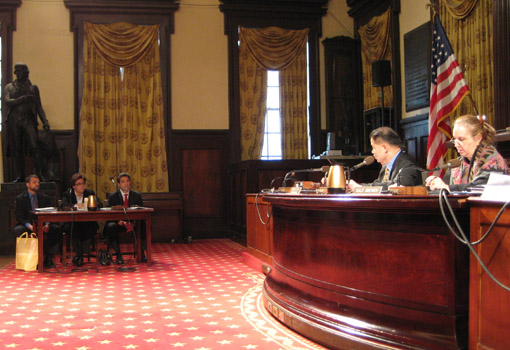Pedestrian Interference

Left to right: New York City Department of Transportation Deputy Commissioner/Senior Policy Advisor David Woloch, Commissioner Iris Weinshall, a procurement and technical servicea aide and City Councilmembers John Liu and Gale Brewer.
As I saw it, the three big bullet points to come out of yesterday’s City Council Transportation Committee hearing on Intro. 199, the Traffic Information & Relief Bill were as follows:
- DOT Commissioner Iris Weinshall expressed unequivocal opposition to Intro. 199. See below for her reasons. She also told a Newsday reporter that New York City’s traffic congestion is more an issue of public perception than a transportation policy and management problem. New York City traffic congestion, the Commissioner says, only seems worse than it ever has been.
- Councilmember Daniel Garodnick announced mid-hearing that he would sign on as a co-sponsor of the bill. Garodnick’s support tips the balance of the Transportation Committee in favor of Intro. 199 and ensures that the bill can move to a full Council vote. With 24 co-sponsors, the bill is two votes shy of passage and 11 votes short of a veto-proof majority. Still, it is hard to imagine that Mayor Bloomberg will allow City Council to pass this kind of legislation. Expect some sort of pre-emptive action from the other side of City Hall.
- DOT Deputy Commissioner Michael Primeggia provided the day’s highlight when he used the traffic engineering term "pedestrian interference" in describing how a street’s "Level of Service" is calculated. What a priceless glimpse in to the profession of traffic engineering and the mind of the man who, essentially, owns and operates New York City’s streets. The next time you’re almost hit by an aggressive SUV driver while crossing the street, think of yourself not as a victim but as "pedestrian interference" impeding that motorist’s Level of Service. As for all of the activities that Danish urban designer Jan Gehl refers to as "public life?" Turns out it’s actually "pedestrian interference."
Yesterday’s hearing kicked off with Committee Chair John Liu’s assertion that New York City is experiencing "unprecedented traffic congestion of epic proportions." Intro. 199, he said, is aimed at helping the city manage its traffic congestion by collecting data in a new way. "We need to pro-actively manage traffic. In order to manage it we have to be able to measure it."
Intro. 199, in short, compels the City to "develop and monitor performance targets with the aim of assessing and reducing the amount of traffic citywide and within each borough." Rather than focusing on "output measures" like the number of traffic lights repaired and potholes filled as DOT currently does in the annual Mayor’s Management Report, the new legislation would mandate that DOT evaluate itself based on "targets" built around specific transportation policy objectives such as reducing congestion and pollution and increasing the percentage of trips taken on buses, bike and by foot.
This is similar to the kind of data collection now being done in London (see the bottom of this Transport for London press release to access TfL’s massive, detailed, annual traffic congestion monitoring report).
Flanked by two aides, Commissioner Weinshall was first to testify. "Under the Bloomberg Administration, DOT has made reducing vehicular congestion and bolstering alternative modes one of our primary goals," she said. She cited the ongoing Bus Rapid Transit study, the Thru Streets program, Muni Meters and the recent bike lane expansion as examples.
Weinshall then cited five reasons for her opposition to Intro. 199 (her full testimony can be found here). First, the City Charter already requires that DOT submit data to the annual Mayor’s Management Report so "any legislation to require additional reporting seems redundant." Second, DOT "is already, in fact, collecting and making available much of the data the bill contemplates." Third, DOT is about two years away from having "new advancing technology as a means to collect data" so it would be premature to make the agency set policy targets now. Fourth, collecting all of this data would be burdensome and expensive. Finally, transportation issues are regional. "Intro. 199 seems to ignore the multi agency nature of our transportation systems," she said. Weinshall also reported that DOT is planning to increase its data collection contract from $600,000 over two years to $3 million.
After her testimony, Liu asked the Commissioner if she thought New York City has a traffic congestion problem. "We would not characterize it as a crisis. We’d characterize it as a challenge," she said. Deputy Commissioner Primeggia added that Central Business District traffic counts were one to two percent higher than their pre-9/11 all-time highs. Weinshall said the increase in traffic is "an indication of the vitality and the growth of the city of New York." This particular rationale for not doing anything to change the dysfunctional status quo of New York City’s streets is also used by Weinshall’s boss, Mayor Michael Bloomberg and the MTA.
Weinshall frequently pointed to the reams of data that the agency already collects and repeated her willingness to share that data with Councilmembers. During his testimony, Chad Marlow, president of the Public Advocacy Group, said that that particular point "warrants further examination."
"I find it peculiar that, so often, when an individual Councilmember needs something done involving traffic or transportation, say, the installation of a new traffic signal or traffic calming measure, DOT’s response is, ‘We don’t have data to back that up,’" Marlow said.
"Yet in their testimony, all the DOT could talk about was how much data they already have and how happy they are to share it. I’m more persuaded by DOT’s day-to-day responses to Councilmember’s
real world problems than by the claims they made at this hearing."